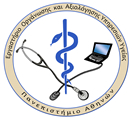Symptoms
The common symptoms of malaria may include:
|
 1. High fever with chills, every 2 or 3 days 1. High fever with chills, every 2 or 3 days
|
|
|
|
 2. Jaundice (yellowing of the eyes, skin and mucous membranes) 2. Jaundice (yellowing of the eyes, skin and mucous membranes)
|
|
|
|
 3. Anemia (paleness) 3. Anemia (paleness)
|
|
|
|
 4. Sweating 4. Sweating
|
|
|
|
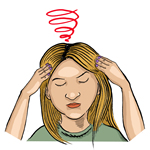 5. Headache 5. Headache
|
|
|
|
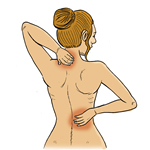 6. Muscle pain 6. Muscle pain
|
|
|
|
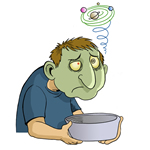 7. Nausea 7. Nausea
|
|
|
|
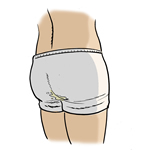 8. Diarrhea 8. Diarrhea
|
|
|
|
 9. Vomiting 9. Vomiting
|
If left untreated, and in severe forms of the disease, the following may develop:
-
Neurological symptoms
-
Renal or respiratory failure
Transmission
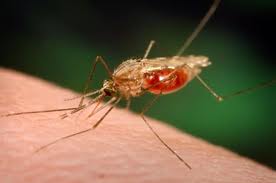
How malaria is transmitted:
-
Usually people get malaria by being bitten by an infectious female mosquito which has been previously infected through biting a person infected with malaria.
-
More rarely through a blood transfusion, organ transplantation, use of contaminated needles and syringes or from a mother to her fetus.
Malaria is not spread from person to person, it cannot be transmitted with casual social contact (e.g. touch, kiss), and it cannot be sexually transmitted.
Treatment
For the treatment of malaria, seek medical help. There are several medicines that are effective against malaria. Treatment should start early and with the indicated therapy the patient will recover. However, the disease may get worse or re-appear if not adequately treated.
Prevention
Measures to avoid bites should be systematically observed, such as:
-
Use of mosquito repellent products applied to exposed skin and over clothing according to the manufacturer's instructions.
-
Spray the air with insecticides
-
Take most precautions during the hours that mosquitoes carrying malaria bite, in particular at twilight and at night.
-
Wear suitable, light-colored, loose clothing covering your body as much as possible (long-sleeved clothing and trousers). Have frequent baths to get rid of the sweat.
-
Properly screen the rooms with gauze over the windows and doors, the skylights, and the chimneys.
-
Sleep under bed nets in places where the mosquito population is high or in cases no other protective measures are permitted (e.g. use of insecticides for infants under 2 months old).
-
Remove stagnant water from cups, cans, vases, pots, and rain barrels around the house and garden, so that the mosquitoes do not have access to water surfaces to lay eggs and breed.
-
Use air conditioning or fans. Cooler temperatures make mosquitoes less active but do not eradicate them. The use of ceiling fans keeps mosquitoes away.
-
Eliminate mosquito harbouring sites by cutting down weeds, mowing the lawn regularly and trimming bushes (where adult mosquitoes find shelter).
-
Use yellow light bulbs around the external areas of your house (yellow light does not attract mosquitoes as much as white light).
High risk groups are infants, pregnant women and patients in immunosuppression.
When to seek medical advice
-
If you are travelling to parts of the world where there is malaria, you should contact the Health Information for Travellers office of KEELPNO or the Divisions of Health and Social Care of your area, 4-6 weeks before your scheduled trip.
-
If you develop symptoms of malaria seek medical assistance even if several months have passed since you were to a place with malaria.
References
keelpno
nhs

















